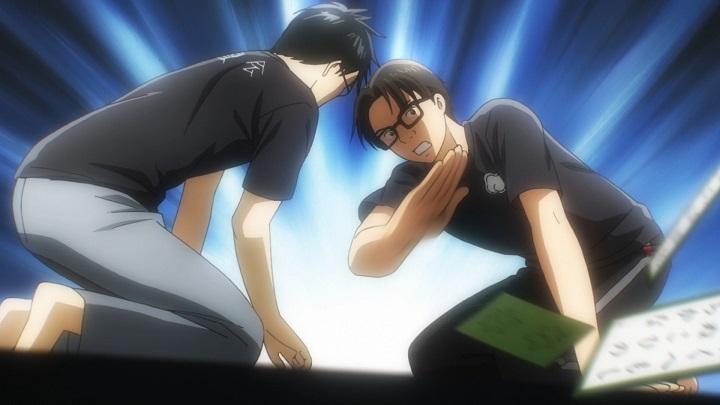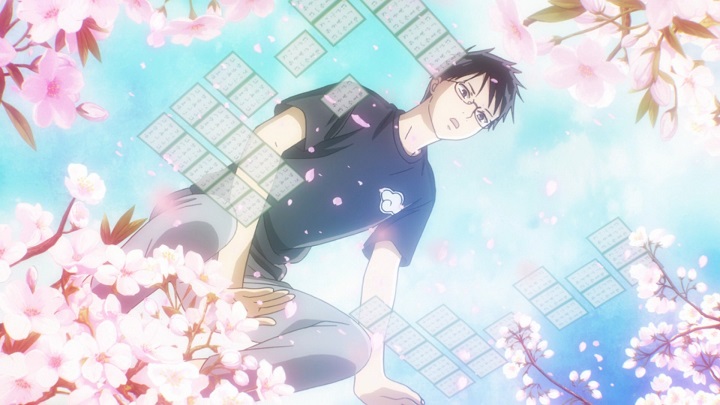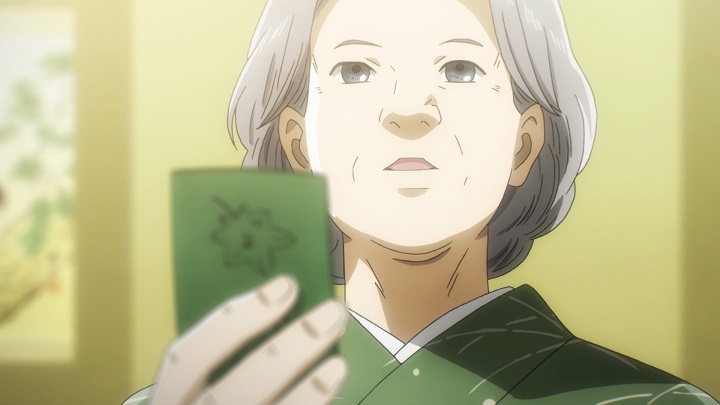Harada-sensei was robbed. I know that he’s not a main character, and I recognize that this tournament has kept Taichi and Arata in view since the beginning. Given that prior focus, it’s only natural that Arata, who made it all the way to the Western qualifier finals, would get the spotlight here. But Harada-sensei is the underdog in all of this! Battling against knee pain and general exhaustion, fighting to prove himself a worthy competitor despite his age, striving for a second shot at the Meijin after losing the title match decades ago – what storyline could possibly be better? Arata is my boy and everything, but the drama of this episode is ultimately the result of his poorly-timed bathroom break.
Okay, that’s not entirely fair. The show does attempt some 3-gatsu-esque depictions of creeping self-doubt, as he questions the status of his relationships with Chihaya and Taichi. Even more than his grandfather, those two are at the center of his love for karuta. Arata quiets his mind by “picturing that room” – the one where the three of them played together as grade schoolers. He’s always thinking back to that time, probably because he’s been through lonely, friendless periods before. A similar feeling of isolation passes over him here, which the show depicts with black sakura petals and an inky post-processing effect to darken the screen. The effect is adequate, but it can’t hope to match the suffocating feeling created by the aforementioned shogi series. It doesn’t need to, necessarily, because Murao snaps Arata out of it and play continues as before.
Or it would have, if Arata hadn’t needed to use the facilities midway through the match. I’m not mad about this development or anything, but it’s pretty dumb that Yuu’s ultimate contribution to the series will be the impact of her bad cooking. On the bright side, some in-depth karuta strategy is born from this stupidity, as Arata must work to determine which dead cards were read while he was out of the room. The show identifies four moments where Murao reacts too quickly to a multi-syllable reading, alerting his opponent to which cards are no longer in play. Unfortunately, we don’t get to see the specific plays where this knowledge makes or breaks the game, but I appreciated that Arata approached the match so strategically (much like Taichi would have).
I have to comment on Murao’s capture of the “Impassionate gods” card, of course. Taichi failed to take the same one last week, and now Arata has repeated his failure. That card has represented Chihaya’s character since the start of the series, so for it to elude both boys who are smitten with her is a big statement. Is this a Platonic Ending flag, or just a misdirect? It’s impossible to tell at this point, as we’re nowhere close to the end of the story – there’s an entire year of high school left for the main trio. There’s plenty of karuta left to be played, as well, starting with Arata vs. Harada-sensei for the honor of facing Meijin Suou. I can’t imagine that Suou will lose (nor do I think Shinobu will forfeit her Queen title); the value of his character lies in how much better he is than everyone else. It’s the power vacuum created by his upcoming retirement that will thrust this series a bit closer to its far-off conclusion.




